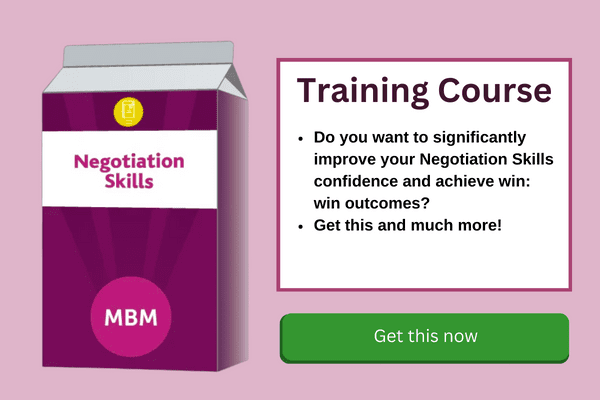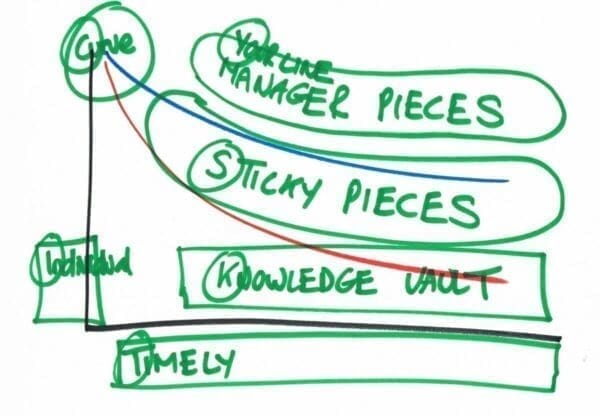Become a Highly Effective Negotiator
Toaday’s topic is Effective Negotiators. Stephen Covey wrote an amazing book called, ‘7 Habits of Highly Effective People’, which was based on his research into the habits of highly effective people. As you can see above, each habit helps us to identify how we can change a piece of the way we work to become more successful.
For example Habit #2 ‘Begin with the end in mind’. It is where Stephen helps us to focus on what we want first before we ‘get stuck in’. On the same theme here are ‘7 Habits of Highly Effective Negotiators’. We’ve taken them from working with thousands of learners over the past decade, helping them to become effective negotiators:

Habit #1: Know your opponent
Many negotiators that we begin teaching know that they should prepare, they just don’t know how. On our Negotiation Skills Programme, named ‘Top Gun’, we share a very effective tool for preparing called a ‘Squaredance’. This tool has been developed over the last decade and is a key piece of our intellectual property – To get a copy of this tool please contact us.
Here is another tool that you can use to prepare better – ‘OPV’. Edward De Bono developed a set of tools that enables us to solve problems easier. One of these tools is ‘OPV’ – ‘Other People’s Views’. At first glance it is too simple. Yet, used properly it can be very powerful.
Firstly, list on a piece of paper all the people in the negotiation, from the direct person of influence, to all the other influencers involved. Secondly, one by one, ‘step into the shoes’ of each person, looking to understand their perspective, their concerns and their wants, writing those thoughts next to each person’s name. This tool can prove invaluable and it will surprise you how much you can glean by almost ‘guesstimating’.

The above image shows the 10 DATT (Direct Attention Thinking Tools) developed by Edward De Bono.
Habit #2: Explore The Arena
Of the 7 stages of negotiating most learners that we begin training either spend little time in stage 2 or skip it all together. We call this stage ‘Exploring The Arena’. Gathering information is vital in a negotiation for 3 reasons:
- Jumping straight to the Proposals stage it is unlikely that your proposal will address the other party’s concerns because you do not know what their concerns are.
- If you don’t know which of the items on his list is more important than another, how can you trade effectively?
- If you don’t have an idea of what price they are looking for, you cannot ensure that you are not giving away a great price.
Spend a good portion of the negotiation in the exploring the arena stage. About two-thirds of the negotiation, so that when you move onto the latter stages of the negotiation you are more even more prepared and know exactly what the arena looks like. Ideally having gathered more information about your opponent’s negotiation than you have given about yours.
Habit #3: Practise Makes Perfect
The words ‘role play’ conjure up fears for many a learner. We say, ‘Don’t role play, bring yourself’, because it is better to sweat in training, than bleed in battle. Role play is an essential tool for every negotiator because whilst role-play is never embraced, once learners get into the role play they soon find that they have forgotten that it is not real. Some negotiations, particularly in the world of supermarkets and their suppliers, can be worth millions and role play can be a very useful tool to uncover the ‘what ifs’, ‘the curveballs’, and the ‘we didn’t think they’d do that’.
An essential part of preparation, particularly for those ‘big’ negotiations is preparing a colleague to be your opponent. Briefing them properly about the type of person your opponent is, what they have done in past negotiations and their thoughts & feelings about the current negotiation, will prove useful. Then book a mock meeting in a few days time, not allowing for ‘hold on, I would have really said..’, or ‘you can’t do that’, and breaks in the negotiation are only called if they are real adjournments.
Sticky Learning ® is 7 times more effective than 1-day training courses. Plus, you will get a Chain of Evidence proving your Return on Investment. Discover soft skills training that changes behaviours long term.

Habit #4: No Free Fish
Negotiating is a high pressured, high stakes activity and everyone wants to do well because there can be a lot at stake, yet most people dislike conflict. In this tough situation it is easy to give away things without even knowing it.
Imagine a fisherman on a huskie pulled sledge with a net of freshly caught fish. A polar bear appears and starts chasing the sledge, but the fisherman cannot outrun the polar bear. He throws the polar bear a fish. What does the polar bear think? ‘I bet there’s more where that came from’.
The situation is similar in negotiating, when your opponent ‘smells’ that you are giving things away, they’ll want more. Make sure that if you do give away free delivery, 10%, an extra 20%, etc. that you have received something in return.

Habit #5: Grease The Wheels
A lot of negotiations ‘get stuck’ either because the ‘exploring the arena’ stage was skipped or because of a lack of preparation by one or both parties. Price is important, of course, and less than effective negotiators end up in a head-to-head locking of horns over price because they do not have enough variables to negotiate.
If two people just negotiated on price they’d probably end up bartering, like at a market in the Middle East, where one party starts low, one party starts high and they’ll probably meet in the middle. This is not negotiating, this is bartering and whilst a valid form of resolving a conflict, it is not negotiating.
To negotiate effectively we must work with a number of variables. That ranges from price, to payment terms, to what’s included in the price, to speed of delivery to quality, and so on. By identifying these potential variables in preparation and/or exploring the arena, we can keep the negotiation moving. Variables are like the grease in the wheels that keep them turning.
Habit #6: Find Common Ground
In the video ‘Secrets of the Science of Persuasion‘ we are told about a case study between MBA students from two famous American schools in Persuasion number 5 – ‘Liking’. The study reveals that two groups negotiate an outcome. The first group are told that ‘Time is Money, get straight down to business’. The second group are told, ‘Before you begin negotiating exchange some personal information with each other’. The results were that the first group reached an agreement in 55% of cases. The second group reached an agreement in 90% of cases. Plus, the value to both parties in the second group was worth +18% more than the first group.
Before negotiating look for common ground.

Habit #7: Summarise The Agreement
Leaving the room after a tough negotiation can be a relief. A tough few hours trying to do your best, battling your wits against another, and then it’s over, phew. Effective negotiators know that a negotiation isn’t over until its’ over. The toughest part might have been the face-to-face meeting, or getting them to agree, or thrashing out a conclusion, but all too often the biggest challenge is still yet to come. This is because either the other party has not delivered on what they agreed, or ‘something else has come up’ or each party had a different understanding of the agreement. The toughest negotiation can be getting them to do what they said they would.
The most effective tool that avoids most of this happening is the Summary. You cannot summarise too much in a negotiation and it is very useful for both parties take the time through the negotiation to agree what has been agreed. It is essential at the end of the negotiation to summarise what has been agreed, in detail, and agree who will type-up what has been agreed (Top tip: Make sure you type it).
Summary
In summary, the 7 Habits of Highly Effective Negotiators are:
- 1: Know Your Opponent
- 2: Explore The Arena
- 3: Practise Makes Perfect
- 4: No Free Fish
- 5: Grease The Wheels
- 6: Find Common Ground
- 7: Summarise The Agreement
For further information, you can find our Ultimate Guide to Negotiation Skills.




